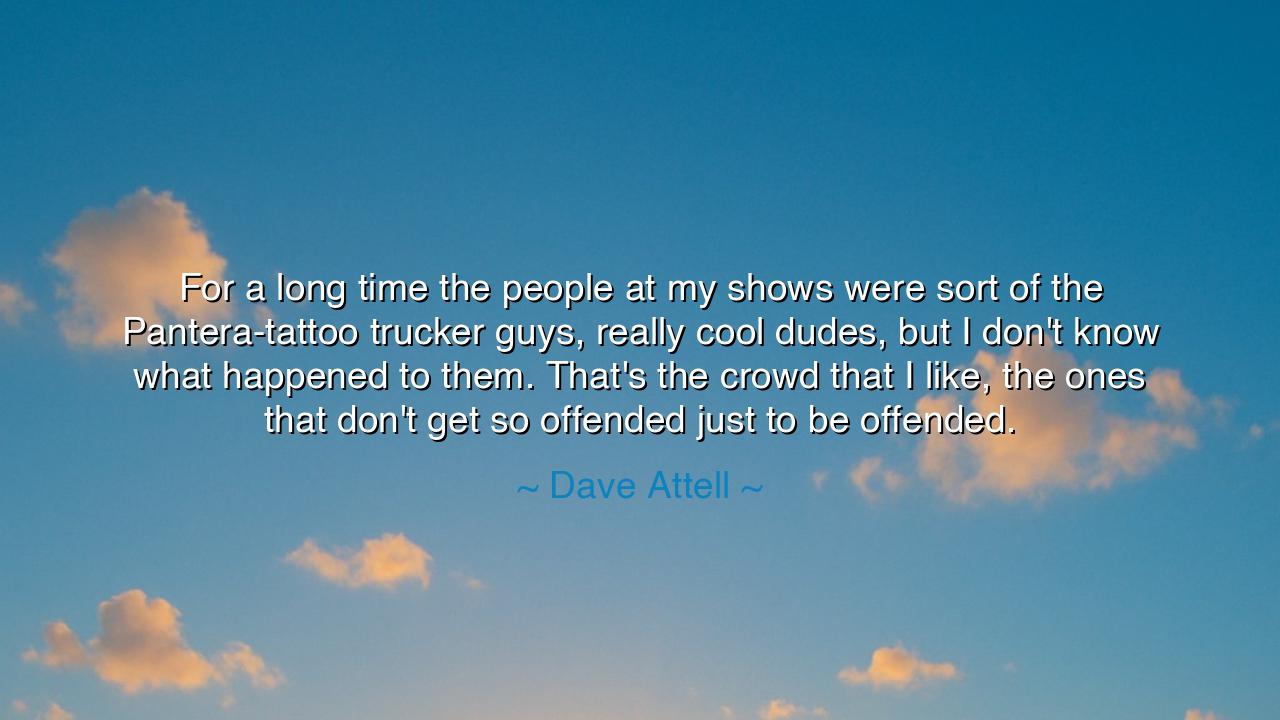
For a long time the people at my shows were sort of the
For a long time the people at my shows were sort of the Pantera-tattoo trucker guys, really cool dudes, but I don't know what happened to them. That's the crowd that I like, the ones that don't get so offended just to be offended.






"For a long time the people at my shows were sort of the Pantera-tattoo trucker guys, really cool dudes, but I don't know what happened to them. That's the crowd that I like, the ones that don't get so offended just to be offended." These words, spoken by Dave Attell, carry a sharp reflection on the changing dynamics of culture and the evolution of social sensibilities. Attell speaks of a time when the people who attended his shows—often characterized by their boldness, resilience, and a certain gritty authenticity—represented a demographic that valued freedom of expression and personal authenticity. They were not easily offended, for they understood that humor and entertainment were meant to challenge boundaries, not cower before them. However, Attell’s words also suggest that over time, something shifted—society, it seems, has become more easily offended, and in doing so, it has lost a certain sense of humor and tolerance.
In the ancient world, there was a tradition of stoic philosophy that emphasized the importance of maintaining composure in the face of criticism, hardship, or discomfort. Marcus Aurelius, the great Roman Emperor, often reflected on how one should face the trials of life without losing equanimity. He famously said, "You have power over your mind, not outside events. Realize this, and you will find strength." To the Stoics, the ability to laugh at oneself, to endure hardship without being offended, and to live in a way that was true to oneself was seen as a mark of strength and wisdom. Much like the crowd Attell describes—those "cool dudes" who could take a joke and understand the nature of entertainment—Stoics found power in not taking offense at every slight or provocation.
The crowd Attell describes, the "Pantera-tattoo trucker guys," represents a type of cultural resilience, one that could appreciate humor without feeling attacked by it. They understood the nature of comedy—its role as both a reflection of society and a tool to push boundaries. Comedy has always served as a mirror to the complexities of human existence, drawing attention to our flaws, our absurdities, and our contradictions. Ancient Greek playwrights like Aristophanes understood this well. His plays often used sharp wit to mock political figures, social norms, and the very hypocrisy of society. These works were not created to offend for the sake of offense, but to invite laughter and provoke thought. In a similar fashion, Attell’s humor challenges his audience to think critically about the world they live in, while simultaneously reminding them not to take everything too seriously.
In more recent history, figures like Richard Pryor and George Carlin embraced a similar approach to humor—one that pushed the envelope, tackled difficult subjects, and did so in a way that was raw, honest, and liberating. These comics understood that humor’s power lies in its ability to bring people together, to confront uncomfortable truths, and to liberate the mind from societal constraints. They too, like Attell’s favored audience, were drawn to a crowd that did not immediately recoil at offensive jokes, but saw the value in laughter as a form of release and reflection. The audience that could laugh at the absurdity of life was, in a sense, stronger than those who retreated behind the barriers of easily bruised sensibilities.
However, in recent times, there has been a shift toward what Attell calls a culture where people are more easily offended, even at the expense of free expression. This is a reality that the ancient Greeks might have warned against, for they understood that critical thinking and humor were tools for societal growth, not threats to personal identity. The rise of the "cancel culture" and the increasing scrutiny over political correctness reflect a society that, in many ways, has lost touch with the liberating power of humor. Instead of embracing diverse viewpoints and laughing at the absurdities of life, people are more inclined to silence or reject what they find uncomfortable, thus stifling the potential for dialogue and understanding.
The lesson Attell imparts is one of resilience, openness, and balance. While it is natural to feel discomfort at times, we must not allow offense to dominate our lives. There is strength in being able to face humor, criticism, and life’s absurdities with a sense of composure and self-awareness. Rather than recoiling from every slight or joke that may challenge us, we must embrace the freedom that comes with seeing humor for what it is—a tool for reflection, growth, and connection.
In our own lives, we must seek a balance between openness to ideas and the wisdom to engage in thoughtful conversation. We should not become so easily offended by the slings and arrows of life, but rather, see them as opportunities to grow stronger and more resilient. Like the crowd Attell admired, we should aim to embrace humor, diversity, and difference without feeling that our sense of self is threatened by them. Laugh, learn, and grow—understanding that life’s imperfections are meant to be lived through, not avoided.
So, take Attell’s message to heart: in a world where offense is too easily taken, let us choose to be resilient, unafraid, and open-minded. Let us reclaim the power of humor, of self-awareness, and of freedom of expression, using them to build bridges instead of walls. The strength of the human spirit lies not in avoiding discomfort, but in learning how to laugh in the face of it, finding wisdom and connection in the most unexpected places.






AAdministratorAdministrator
Welcome, honored guests. Please leave a comment, we will respond soon